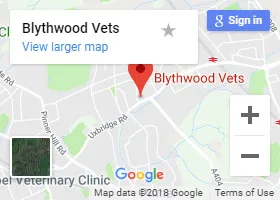A number of diseases can still affect dogs in the UK, and one can even be transmitted to humans. Dog vaccinations are the only safe way to provide immunity against these diseases, and if carried out regularly according to your vet’s advice, they can protect your pet for life.
Immunity and dog vaccinations
Immunity is the body’s natural ability to fight infection. A dog vaccination confers immunity by exposing the body to a small but entirely harmless dose of the disease in question.
Immunity in puppies
Puppies are usually protected during the first few weeks of life, thanks to the immunity passed through the mother’s first milk (colostrum). However, this immunity fades rapidly, leaving the puppy susceptible to disease within a few weeks. At this point, vaccination can take over from the mother, providing protection.

The puppy’s first vaccination
When a puppy is first vaccinated, they usually receive a course of 4 injections. The first 3 are given 4 weeks apart, and the final vaccine is administered at around 26 weeks of age.
The vet will also give your new puppy a general check-up. It is important for young puppies to socialise with other animals as it improves their behaviour in later life.
However, vaccination does not work immediately; it takes a few weeks for immunity to develop. Your vet will advise you on when it is safe to let your puppy meet others.
What diseases do we vaccinate against?
- Canine Parvovirus, a hardy virus that can survive for long periods of time in the environment. It is often fatal.
- Canine distemper (hard pad) is another severe, usually fatal disease, rare in the UK in recent years due to vaccination.
- Infectious hepatitis still exists in the UK (although rare due to vaccination) and is often fatal.
- Leptospirosis contracted from the urine of rats and/or other dogs. Canals and rivers can be contaminated and forms of the disease are widespread in the UK. Can also cause severe disease in humans (Weils disease).
- Kennel cough, is a highly contagious respiratory disease that causes a harsh, dry, and unpleasant cough. It is typically spread in places where dogs congregate, such as kennels, shows, or busy parks. Dogs of all ages can be affected; it is caused by a number of bacterial and viral agents. The coughing can last for some weeks and during this time serious complications such as pneumonia may arise, especially in puppies or older dogs, or where there are other health problems. Such complications can occasionally prove fatal. Little can be done to cure the disease once it has started; you simply make the animal as comfortable as possible and try to control the cough with cough medicines (veterinary advised). In more severe cases, antibiotics and other drugs may be needed to control secondary complications. It usually subsides after a few weeks. If your dog is likely to be in close contact with other dogs, you should consider an intranasal or injectable kennel cough vaccine, providing coverage for a full 12 months. This vaccine can be given at the same time as the annual vaccination and health check It is highly recommended and most boarding kennels now require evidence of this vaccination before accepting your dog.
- Rabies, a fatal disease, not found in the UK. Vaccination is required if your dog is travelling abroad.
Book a vaccination appointment
Immunity to disease may fade, leaving your dog at risk. Some diseases require booster vaccinations every three years, whereas others need them annually. An annual visit to your vet will allow for a general health check and necessary boosters.
Spread the cost of essential healthcare for your pet

To spread the cost of pet vaccinations, Blythwood Vets offers the Pet for Life Health plan, which includes vaccinations for your pets, including kennel cough for dogs.
New puppy?
Getting your puppy vaccinated is essential for your new pet’s health and plays a pivotal role in their preventative healthcare throughout their life. Register your pet with us online today to book an appointment at Blythwood Vets.
Kennel Cough In Dogs
Kennel Cough is an infection that can affect a dog’s respiratory system. Much like respiratory infections in humans, kennel cough is caused by a variety of different bacteria and viruses that lead to infectious bronchitis in dogs.
The most obvious sign that your dog has kennel cough is the cough itself. This can appear forceful, with your dog sounding like they have something stuck in their throat. It is often accompanied by a dry cough, sometimes followed by gagging or difficulty swallowing. On occasion, this type of cough can be easily mistaken for a sneeze, retching, a normal cough, a choking fit, or gasping for breath. It is key to seek advice from your local veterinarian at Blythwood Vets if your dog has been experiencing a cough.
Other signs or symptoms to be aware of can include sneezing, a runny nose or discharge around the eyes.
FAQs
Are yearly dog vaccinations necessary?
It is recommended that dogs receive their annual booster vaccinations to maintain their immunity and protection against dog diseases. The vaccines dogs typically require annually include Leptospirosis and if used, Kennel Cough. It is best to speak with your vet about the appropriate vaccines and frequency for your pet.
What vaccinations do dogs need?
- Infectious Canine Hepatitis: A viral disease spread via saliva, urine, blood, faeces, and nasal discharge. This disease affects the liver, kidneys, eyes and lungs of a dog.
- Leptospirosis: A bacterium that dogs can become infected with via contact with urine and stagnant water. This bacterium affects the kidneys and liver, causing dogs to become seriously ill.
- Distemper: A viral disease affecting the respiratory and nervous system. The virus is spread via urine, blood, saliva, sneezing and shared food bowls.
- Canine Parvovirus: ‘Parvo’ is a life-threatening disease that is spread through saliva and faeces of infected animals. Parvo symptoms include vomiting, diarrhoea, dehydration and anorexia.
- Kennel Cough: A highly infectious respiratory infection that is airborne. Symptoms include coughing and retching.
- Rabies:A fatal but preventable viral infection primarily affecting the central nervous system. While not present in the UK, dogs travelling abroad require a rabies vaccination.
Do dogs need vaccines every year?
Dogs should receive their yearly vaccinations throughout their life to prevent illness. Not all vaccines are needed annually, but your vet will recommend the pet vaccinations for your dog’s needs.
What injections does a puppy need?
- Distemper: spread by eye and nose discharge dog to dog
- Canine Hepatitis: spread by infected urine, faeces and saliva
- Leptospirosis: is spread by contact with urine and blood of infected animals or stagnant water where infected animals have been.
- Parvovirus: spread via infected faeces dog to dog
Adult Dogs: Adult dogs require annual booster vaccinations to maintain protection.
When can puppies have their injections?
Your puppy can start receiving vaccinations as early as 8 weeks. They still require booster vaccines every year.
At 12 Weeks (or 4 weeks after the first injection), the second round of Distemper, Hepatitis, and Parvovirus vaccinations, along with the second Leptospirosis vaccination, is administered. To ensure adequate protection, a third vaccination against Distemper, Hepatitis, and Parvovirus should be given another four weeks later (at 16 weeks of age). The vaccination course for puppies is completed with a final vaccination against Distemper, Hepatitis, and Parvovirus at 26 weeks of age.
Do dogs need kennel cough vaccine?
Kennel Cough is a highly infectious airborne disease, which is why Kennel Cough vaccines are recommended for all dogs from the age of 6-8 weeks old. All dogs going into a kennel or daycare generally require this vaccination before socialising to avoid the disease spreading and to reduce the symptoms if illness is caught.
Is Kennel Cough In Dogs Life Threatening?
Fortunately, for most healthy dogs, kennel cough is not normally dangerous; it will likely not need any treatment.
If you have a puppy, an elderly dog, or a dog with pre-existing conditions, it is vital to be aware of these symptoms in order to seek veterinary advise. Kennel cough can develop into a more serious condition, possibly resulting in bronchitis for some dogs.
Vaccinations for Kennel Cough in Dogs
Dog vaccinations include some of the infections that can cause kennel cough. It is therefore vital to ensure that your puppy receives their full initial cycle of vaccinations, followed by annual boosters.
The most common bacteria in Kennel Cough are Bordetella Bronchiseptica. This can be given to dogs as a separate vaccine, applied as . Although this will not guarantee protection, it can help to lessen the symptoms.
It is key to note that if your dog is already incubating kennel cough, the vaccine will be ineffective.
If your dog has been experiencing symptoms of Kennel Cough, or you have not yet booked your initial or annual dog vaccinations, speak to Blythwood Vets today. Our team can get your dog booked in with us in North London.
Bulldog
Entropion: This is when an eyelid rolls inward, causing hair to rub against the eye. This can lead to symptoms like squinting, eye discharge, and redness, and may cause corneal ulcers. In English Bulldogs, this condition is often hereditary but can also result from eyelid scarring or spasms following a corneal ulcer. For adult dogs, corrective surgery is usually needed, while puppies may undergo a temporary procedure to prevent the hair from irritating the eye. It's best not to breed dogs with this condition.
Ectropion: This is the opposite of entropion, where the eyelid rolls outward, exposing the conjunctiva (the clear, thin membrane covering part of the eye and inner eyelids), which can become red and inflamed. Milder cases can be managed with eye drops, while surgery might be necessary for more severe cases. Breeding affected dogs is discouraged.
Elbow Dysplasia: This term covers various developmental issues with the elbow joint. Puppies aged 4-12 months typically show symptoms, like lameness in the affected forelimb. If both front limbs are affected, identifying lameness can be tricky. Initial diagnosis often involves X-rays, but CT scans and arthroscopy might be needed for a definitive diagnosis and treatment. Surgery usually helps, but weight management, pain relief, and physical therapies are also beneficial. Untreated, this condition can lead to osteoarthritis later in life. Since it's a genetic issue, breeding affected dogs is not recommended.
Skin Fold Pyoderma: English Bulldogs often have excessive skin folds, particularly on their face, tail base, and around the vulva in females. These folds can trap moisture, promoting the growth of bacteria and yeast, leading to painful infections if the skin becomes ulcerated. Regular cleaning of these folds is crucial to prevent infections, so ask your vet for advice on the best way to do this. If an infection occurs, see your vet for treatment. Severe cases might require surgical removal of the skin folds.
Dry Eye/Keratoconjunctivitis Sicca (KCS): KCS involves inflammation of the cornea and surrounding structures due to dry eyes from reduced tear production. The most common cause is immune-mediated damage to the tear glands and is believed to be inherited. Symptoms include painful, red, and squinting eyes with thick yellow discharge, and a loss of the eye’s shiny appearance. Corneal ulcers are a common secondary issue. Diagnosis is confirmed through an eye exam and tear production measurement. Lifelong treatment with topical eye drops is required to replace tears and suppress the immune response.
Cherry Eye/Nictitans Gland Prolapse: This condition occurs when the nictitans gland, normally contained within the 'third eyelid,' prolapses, appearing as a cherry in the inner corner of the eye. It's easily diagnosed by its appearance, and surgery is recommended to tuck the gland back into place.
Brachycephalic Obstructive Airway Syndrome (BOAS): Brachycephalic dogs, like English Bulldogs, have a short head shape, which can restrict airflow to the lungs. Common issues include narrowed nostrils and an elongated or thickened soft palate. Almost all English Bulldogs experience some degree of BOAS, leading to breathing difficulties, heat intolerance (increasing the risk of heat stroke), acid reflux, and poor sleep. Affected dogs may snore or snort when resting and exercising. Vets can assess the severity of BOAS to determine if surgery to open the nostrils or shorten the soft palate would improve the dog's quality of life. Additionally, the trachea (windpipe) in English Bulldogs may be underdeveloped, causing a narrowed opening (tracheal hypoplasia).






